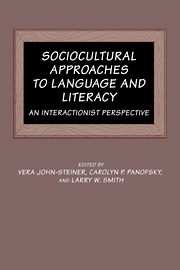Part III - Functional systems
Published online by Cambridge University Press: 05 November 2011
Summary
The challenge of adult literacy acquisition and the mastery of specialized forms of writing have become of special interest to educators and psychologists within the past three decades. A variety of approaches govern their efforts. Some educators emphasize traditional methods, including drills (see Kazamek's discussion, 1988), paying little attention to the specific cognitive and emotional needs of adult students. A more powerful approach was developed by Moffett (1981), who emphasizes the expressive aspects of writing, and considers formal features, such as spelling and punctuation of secondary importance. The approaches of particular relevance to the chapters presented in this volume are those in which functions of literacy are examined as practiced and taught in different societies. As Heath (1980, p. 126) writes: “Literacy acquisition is often a function of society-specific tasks, which are sometimes far removed from those of formal schooling, and are not conceived of as resulting from effort expended by ‘teachers’ and ‘learners.’”
Scholars who approach literacy as a societal process of which the individual learner is a part rather than its sole focus bring an interdisciplinary point of view to its analysis. The functions, contexts of use, as well as the historical conditions in which writing has developed in a particular community, provide researchers such as Scribner and Cole (1981) part of the framework for the study of literacy in nonschool settings. The social view of literacy put forth by Paolo Freire (1970) has had a substantial impact upon the teaching of literacy.
- Type
- Chapter
- Information
- Sociocultural Approaches to Language and LiteracyAn Interactionist Perspective, pp. 299 - 304Publisher: Cambridge University PressPrint publication year: 1994



